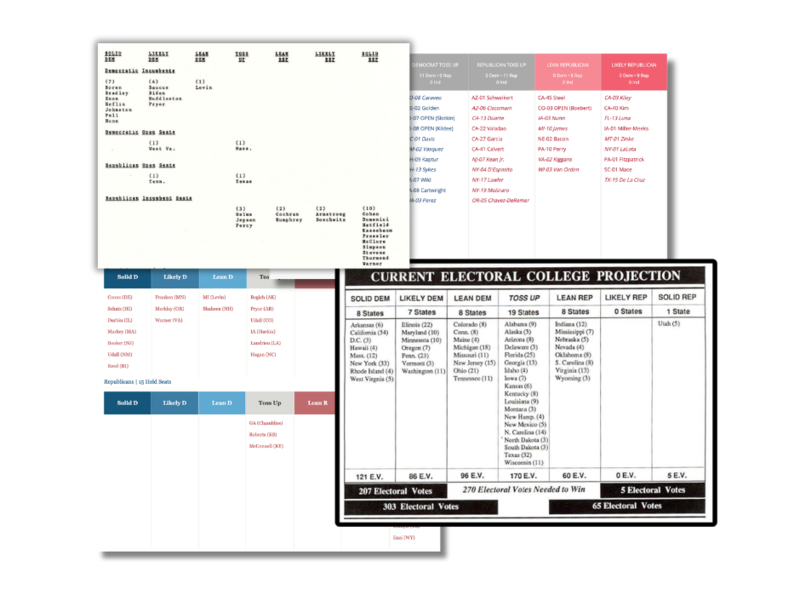
Alabama Democratic Senator Doug Jones was always going to be the most endangered incumbent in 2020. He narrowly won a 2017 special election over Roy Moore, the deeply flawed and controversial GOP nominee, and has had a target on his back ever since. But the perfect storm that helped Jones become the first Democratic senator Alabama had elected in a quarter-century won’t be replicated this November.
Yes, Moore — who faced allegations of sexual misconduct toward teenage girls from decades earlier that surfaced during the race — is running again. But the former Alabama Supreme Court chief justice is now persona non grata within Republican circles after losing and has virtually no chance of winning the nomination. The March 3 primary looks to be coming down to former Attorney General Jeff Sessions, whose vacancy of this seat led to Jones’s victory in the first place, with former Auburn football coach Tommy Tuberville and Rep. Bradley Byrne fighting for a slot in the runoff. We’ll have more analysis on that primary in next week’s newsletter.
Jones’s electoral prognosis was grim even before he announced today he will indeed vote to convict and remove President Trump in the Senate impeachment trial. That’s not a winning vote to take in a state Trump carried by 28 points four years ago, will easily win again this year and remains incredibly popular in. Our analysis that this race is moving away from Jones, no matter what he does, solely on the fundamentals would have been the same had he voted to acquit Trump.
Jones isn’t even among the most bipartisan senators. For the 115th Congress, the Lugar Center ranked Jones as the 36th in bipartisanship. FiveThirtyEight finds that Jones has voted with Trump 36.8% of the time, putting him behind other Democrats like West Virginia’s Joe Manchin and Arizona’s Kyrsten Sinema. And he was also ranked behind all four Democrats who lost in 2018 — North Dakota’s Heidi Heitkamp, Missouri’s Claire McCaskill, Florida’s Bill Nelson and Indiana’s Joe Donnelly. Of that quartet of states, only North Dakota voted for Trump by a larger margin than Alabama.
On the other highest-profile vote of his career — the Supreme Court nomination of Brett Kavanaugh — Jones also voted with Democrats and against confirmation. The same is true for Jones as it is for the other most vulnerable Republican incumbents this cycle — there is ultimately little incentive for them to buck their party. A contradictory vote would likely do little anyway to woo a shrinking bloc of independent voters or even Republicans, and they all must rely on their base to win anyway. For Jones, he still needs Democrats for fundraising and support — and it’s been speculated a possible spot in a Democratic administration if he does lose re-election.
So for all those reasons, we are moving the Alabama Senate race from Toss-Up to the Lean Republican column, meaning it is the first to move into takeover territory for either party this cycle.
With this new calculus, Democrats now need a net gain of four Senate seats if they win the White House or five if they don’t. What this doesn’t change though is that the majority is still in play and that Democrats still have a path to getting there. It’s hard to see the Senate flipping if the White House doesn’t too, and there are still multiple paths to those four seats for Democrats. Three GOP incumbents remain in Toss Up — Arizona’s Martha McSally, Maine’s Susan Collins and Colorado’s Cory Gardner. North Carolina’s Thom Tillis is teetering on the edge of being there too, and we’ll have analysis in this Friday’s newsletter of how the impeachment trial and acquittal votes affect those endangered Republicans. Last month we moved both the Kansas and Georgia Senate races in Democrats’ favor. So while this is good news for Republicans, overall, they still have a tough task in defending their majority.
Image Credit: AP Photo/Jose Luis Magana










Subscribe Today
Our subscribers have first access to individual race pages for each House, Senate and Governors race, which will include race ratings (each race is rated on a seven-point scale) and a narrative analysis pertaining to that race.